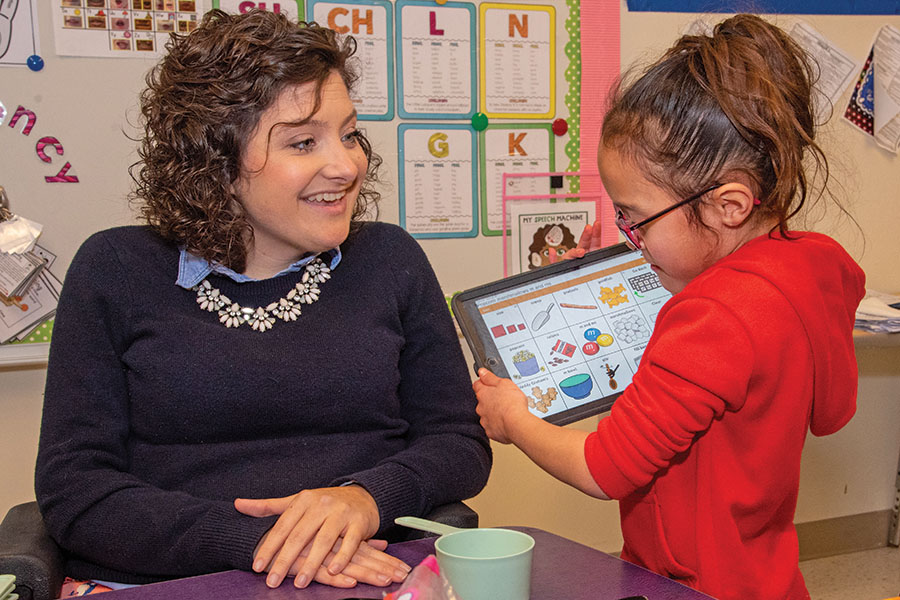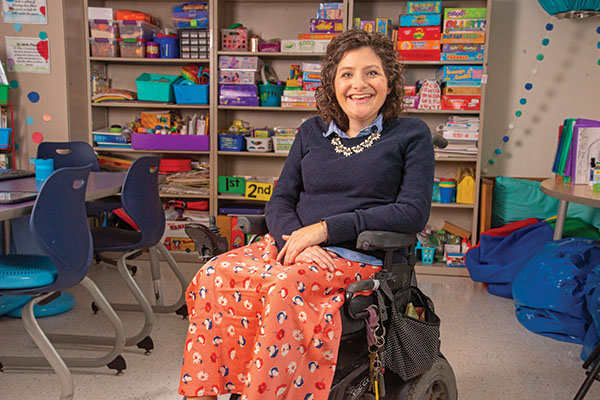Their Life's Work
‘Everyone should have a voice.’
As a speech-language pathologist, Jess Charboneau ’09, ’11G empowers her students through communication.
by Sally Parker

Jess Charboneau ’09, ‘11G works with a first-grade student who uses a speech-generating device that supplements or replaces natural speech.
Everyone should have a voice, and Jessica Charboneau ’09, ’11G is on a mission to make that happen.
A speech-language pathologist, Charboneau helps children work through communication challenges. Most of her students at Dr. Weeks Elementary School in Syracuse, New York, are 5- to 8-year-olds who live in the school’s vibrant Northside neighborhood. Many are refugees and new Americans. They speak 14 languages and represent over 20 different countries.
Meeting all of the needs of her 45 students, with their different backgrounds and educational goals, is Charboneau’s biggest challenge. But it’s also her biggest reward.
“One of the things I love the most about my job is to meet that challenge every day. It’s super rewarding,” she says. “At the very heart of it, I’m working on communication and making sure everyone has a voice. That’s why I went into speech therapy.”
Huddled in a small group, Charboneau and her students work on developing language skills, learning new vocabulary, bettering speech articulation and speech fluency skills, or overcoming a stutter — often while students are also learning English.
Hands-on projects generate a flurry of excitement. Charboneau creates lessons that parallel what students are exploring in their classrooms, reinforcing the material and giving them a boost of confidence.
“Last year we went big and hatched chickens. We learned about the life cycle of the chicken, we candled the eggs, had an incubator, hatched the eggs, all while engaging in small-group learning time,” she says.
When students go back to their classrooms, they can be experts among their peers, she adds. “When we work on similar content, then they feel more excited to be able to share. That’s sometimes the only time they’ll raise their hand and answer a question.”
For children who are pre-verbal or nonverbal, Charboneau introduces life-changing communication technology, such as a speech-generating device, that supplements or replaces natural speech.
One of her biggest joys is getting to know her students’ families and friends — sharing a meal or attending a community gathering.
“As much as I love my job, clearly, what I really love the most about it is being able to connect with the community and families even outside of my job,” says Charboneau, who grew up in suburban Fayetteville. “At first I only had my therapist hat on, but I realized I have to get to know my families first and more personally, and understand the community that we’re all part of.”
Charboneau is also attuned to how her students’ families are coping with their disabilities. She knows well the strain it brings to a family: Her own journey with muscular dystrophy started in fourth grade. Three years later, she was outfitted with a wheelchair. Sharing her experiences with her students ignites moments of authentic connection in the classroom.
“I tell them, ‘You use a device to communicate, I use a chair to help me move. We’re all different in the way we do things, but we all get it done.’”
Charboneau says her time at Nazareth produced not only a circle of friends who continue to get together today, but a lasting sense of mission for her life.
On her last day of graduate school, a professor who had set up a key internship for her pulled Charboneau aside. “She looked me right in the eye and just told me, ‘I have no doubt you are going to change the world and really help other people.’ I’ve always held on to that. That’s my charge.”
Sally Parker is a writer in New York’s Mid-Hudson Valley.
